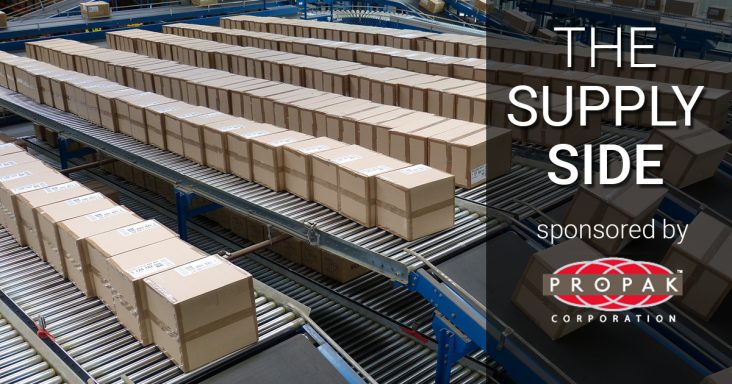The Supply Side: Supply chain innovation key to better customer service
by May 21, 2022 11:21 am 1,812 views

Walmart, a leader in supply chain innovation with more than four decades of experience over chief competitor Amazon, is still challenged to meet consumer demand, according to David Guggina, senior vice president of innovation and automation at Walmart U.S.
He said Walmart continues to innovate within its supply chain and transportation segments and store operations.
“We are reshaping work for our associates [employees] like in our next generation fulfillment centers that use technology to increase efficiency, reduce friction and allow for faster delivery times to stores,” Guggina said during a presentation at the Plug & Play Expo event held in Bentonville on April 26.
He said Walmart is working toward a fully automated supply chain that includes robotics and scanners in warehouses to handle repetitive tasks like palletizing shipments bound for stores and accurately counting inbound and outbound inventory.
Guggina said Walmart also uses Mobius, a tech innovation built in-house. Mobius is a digital clone of the supply chain that allows Walmart to simulate the movement of goods through each leg of the journey. He said Walmart could test technology applications with the digital clone without disrupting the supply chain. He said it’s been a great tool to help Walmart better deploy capital toward supply chain efficiency.
Guggina said smart pallets allow for faster shelf restocking, which helps with on-shelf availability, which was challenged amid the lengthy pandemic. An example of that, in some cases, is bolt-on technology like robotic arms that quickly unload trailers and load packages on conveyors where high-resolution scanners keep track of inventory sent downstream. The sophisticated pallet system is loaded entirely by robots that layer cases by aisle and department for a more accessible breakdown when the store receives it.
He said the results of many ongoing supply chain innovations are designed to serve customers better. Grocery fulfillment centers are also highly automated with robotics and technology that can withstand low cold-chain temperatures. The automation allows for faster delivery times to stores, increasing the freshness window. Guggina also spoke about a partnership with Platform Science that resulted in new transparency and connectivity tools for its 12,000 truck drivers. The tech application helps drivers with scheduling and communication while on the road.
“We are solving some incredibly big problems, and we cannot solve them alone,” Guggina said.
Jake Fields, the co-founder of San Diego-based tech/fleet management startup Platform Science, said his path crossed with Walmart three years ago. He opted to stop by a Plug & Play event held at Crystal Bridges Museum of American Art in the spring of 2019. Plug & Play is a venture capital firm based in Silicon Valley, with an office in Bentonville that focuses on funding and accelerating startups in the supply chain, sustainability and health. Fields said he had been at another event in Alabama the day before and stopped in Bentonville to pitch at the Plug & Play in 2019.
He discussed his technology that links truck drivers to their home bases, delivery routes, weather and other pertinent information, then left the building and headed toward the airport. Before reaching the airport, his phone rang. A Plug and Play representative was on the other end and told him Walmart wanted a meeting to discuss the technology further.
“I turned around and met with Joe Metzger, head of supply chain at Walmart, who had been in the room and heard my pitch,” Fields said. “He said Walmart was looking for this technology with its driver fleet. The company had started working on the tech application, and Platform Science could help them finish it quickly.”
Fields said Platform Science had already signed on with trucking firm Schneider National to use the technology that gives drivers first-hand visibility on what their day looks like. Scott Donahue, vice president of innovation and automation at Walmart U.S., said the retailer wanted to provide drivers with a better experience. More visibility was needed into the location of approximately 12,000 truckers at any given time. A significant need was to let stores know what time to expect their truck delivery each day to schedule staff accordingly.
Donahue said Walmart has started on the application but needed some help to deploy it across its vast network. He said that by working with Fields, Walmart was able to deploy its application on Platform Science’s infrastructure.
“Because they were a small and scrappy startup, they allowed us to customize and work with them on the project. We had direct access to the CEO, and they were able to pivot quickly when needed,” Donahue said.
Walmart rolled out the technology to its 12,000 private truck drivers and 65 locations simultaneously in the pilot last year. The benefits have been exponential as he said the net promoter score (satisfaction rating) among drivers rose from 20 to 95 once the technology was fully deployed. He said the driver experience is improved, and stores now know precisely when their truck will arrive so they can schedule staff. That ensures that fresh produce flows from the back door onto the shelf promptly.
The technology partnership with Platform Science has been so successful that Walmart is now expanding it to every load moved for the retailer — 50,000 shipments a day through various carrier partners. Donahue said the partnership with Platform Science continues to grow, and Walmart can also benefit from future lessons learned and best-in-class practices shared by the partners.
According to the company’s last earnings report, Walmart’s bulk of capital spending is tied to supply chain innovations, roughly $17 billion this year, focusing on automation and customer-facing initiatives and technology.
